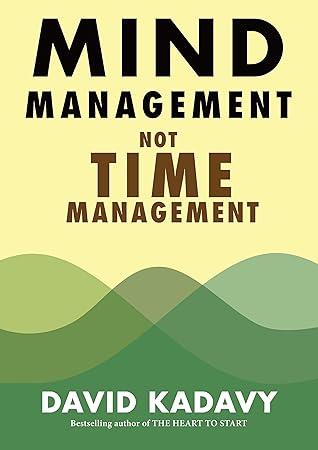More on this book
Community
Kindle Notes & Highlights
Mind Management, Not Time Management: Productivity When Creativity Matters (Getting Art Done Book 2)
by
David Kadavy
Read between
December 8, 2021 - January 20, 2022
I had discovered that making progress on my first book wasn’t so much about having the time to write. It was about being in the right state of mind to do the work at hand.
Scientists who study creativity define it as coming up with something both novel and useful.
Your edge as a human is not in doing something quickly. No matter how fast you move, a computer can move faster. Your edge as a human is in thinking the thoughts behind the doing. As entrepreneur and investor Naval Ravikant has said, “Earn with your mind, not your time.”
What we now think of as “time management” is a child of Taylorism.
“the point of diminishing returns.” That’s the point at which each additional production unit doesn’t get you the same output as the previous production unit.
diminishing returns. It’s the point of negative returns. This is where the additional production unit doesn’t just bring you lower returns than the previous production unit – it actually causes your total output to be less
Time is apparently money when your boss is using it, yet somehow it’s “free” time when it’s leftover for you to use.
Rhythms within our bodies and within the world around us make each hour different from the next. Some hours are better for thinking analytically. Other hours are better for thinking creatively.
In creativity, unlike in moving chunks of iron, action and result are hard to connect.
today’s productivity is about creating the conditions within your mind to have valuable thoughts.
“Eisenhower method” of choosing the not-urgent-but-important over the urgent-but-not-important, as made famous by Steven Covey’s 7 Habits of Highly Effective People.
it’s those who can cultivate Deep Work who will get an edge.
What work am I in the mood to do right now? Then, ask yourself, What do I need to do that fits that mood?
The lesson is that if you don’t fill your life with the important things first – the “big rocks” – you’ll never have room for those big rocks at all. First Things First.
Coming up with ideas requires divergent thinking, but actually producing something with those ideas requires the opposite of divergent thinking.
The Eureka Factor: Aha Moments, Creative Insight, and the Brain,
Obvious connections are the obstacle to novel ideas.
The challenge in finding your Creative Sweet Spot is to find a time and place where less-obvious connections get a chance to shine.
The longer you write without stopping, the less and less valuable each additional hour will become.
The more alert we are, the less prone we are to doing the divergent thinking necessary to have great insights.
The First Hour Rule is simply this: Spend the first hour of your day working on your most important project, and your most important project, only.
Studies suggest that you’re more creative when mildly sleep-deprived than you are when well-rested.
insights, sleep is vitally important to the memory consolidation that’s necessary to have good ideas.
being extremely busy doesn’t just decrease creativity on the day on which you’re busy. It also reduces your creativity the next day, the day after that, and throughout the project.
When you hit an impasse, it’s often because you’re using too much of your brain power on connections that won’t lead you to a solution.
“fixation forgetting.” Incubation helps you forget bad ideas, which makes room for good ideas.
When you’re trying to achieve Illumination, stop yourself from getting caught up in Verification.
Because relaxation promotes creativity, that relaxation would then enable breakthrough writing sessions.
These are the Seven Mental States of Creative Work: Prioritize, Explore, Research, Generate, Polish, Administrate, and Recharge.
Remember, exploration is a state of openness – of being comfortable with not making progress. Generation is the state of producing something.
The goal of exploratory writing isn’t to create something I can form into a final product. Rather, I’m merely exercising the thoughts in my mind.
“the farther away you perceive an object, an incident, or an event, the more abstract, broad-minded, big-picture, broad-brush-thinking mindset you get into.”
a background noise level of about seventy decibels is optimal for idea generation.
A Creative Cycle is a repeatable progression of focus and release.
online marketers know Tuesday is a hot day to debut anything – whether a blog post, a new book, or an album. There’s simply way more activity on the internet on Tuesdays.
“Science shows us that our brains work better in sprints than they do in marathons,”
Daniel Kahneman and Amos Tversky coined this “the planning fallacy.”
Incubation takes place whether you’re doing nothing at all, or you’re doing something unrelated to the problem at hand. Information is passing from your short-term memory, into your long-term memory. You’re forgetting the weak connections that lead to bad ideas and bolstering the strong connections that lead to good ideas.
Smaller units of time are harder to waste. When you create a sense that there’s only now, you don’t procrastinate.
doing what you want to do improves your mood, which leads to better ideas.
Creative Systems are repeatable processes that help you bring creative works from idea through execution.
the Minimum Creative Dose is the smallest action you can take on a creative project to make progress on that project.


